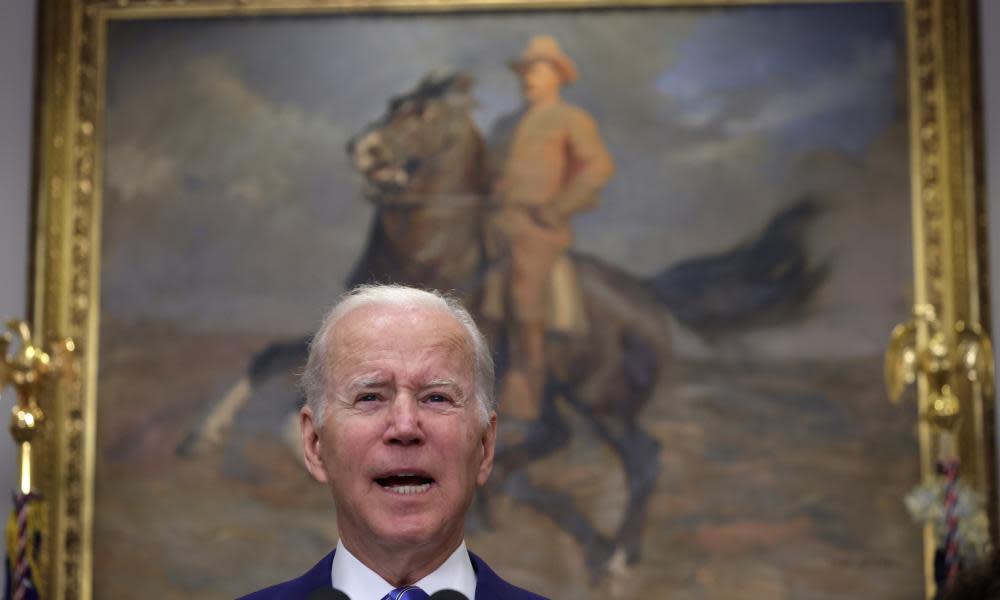Biden warns LGBTQ+ children could be next target of Republican ‘Maga crowd’

- Oops!Something went wrong.Please try again later.
- Oops!Something went wrong.Please try again later.
Joe Biden has warned of new attacks on civil rights as the supreme court prepares to strike down the right to abortion, telling reporters at the White House that LGBTQ+ children could be the next targets of a Trump-dominated Republican party he called “this Maga crowd” and “the most extreme political organisation … in recent American history”.
Related: Contraception could come under fire next if Roe v Wade is overturned
“What happens,” the president asked, if “a state changes the law saying that children who are LGBTQ can’t be in classrooms with other children? Is that legit under the way the decision is written?”
Biden’s remarks, at the end of a brief session on deficit reduction, referred to a leaked draft of a ruling by Justice Samuel Alito. One of six conservatives on the supreme court, Alito was writing on a Mississippi case which aims to overturn both Roe v Wade, the 1973 ruling which guaranteed the right to abortion, and Casey v Planned Parenthood from 1992, which buttressed it.
The Mississippi case is expected to be resolved in June. The leak of the draft ruling to Politico, which reported that four other conservatives on the nine-justice court supported it, caused a storm of controversy and anger.
In a statement and remarks on Tuesday, Biden condemned Alito’s reasoning and intentions and called for legislation to codify Roe into law.
But the president has faced criticism within his own party for seeming reluctant to contemplate reform such legislation would require, namely abolishing the Senate filibuster, the rule that requires 60 votes for most bills to pass.
A lifelong Catholic who nonetheless supports a woman’s right to choose, Biden has been eclipsed as a strong voice against the attack on abortion rights by high-profile Democratic women including the Massachusetts senator Elizabeth Warren, who spoke angrily outside the court on Tuesday, and the vice-president, Kamala Harris.
Harris’s struggles as vice-president have been widely reported but on Tuesday night, speaking to the Emily’s List advocacy group in Washington, she seemed to hit her stride.
The former prosecutor and California senator said: “Those Republican leaders who are trying to weaponise the use of the law against women. Well, we say, ‘How dare they?’
“How dare they tell a woman what she can do and cannot do with her own body? How dare they? How dare they try to stop her from determining her own future? How dare they try to deny women their rights and their freedoms?’”
She asked: “Which party wants to expand our rights? And which party wants to restrict them? It has never been more clear. Which party wants to lead us forward? And which party wants to push us back? You know, some Republican leaders, they want to take us back to a time before Roe v Wade.”
At the White House on Wednesday, Biden took brief questions. He was asked about sanctions on Russia over the invasion of Ukraine and about “the next step on abortion once this case gets settled”.
“As I said when this hit, as I was getting on the plane to go down to Alabama, this is about a lot more than abortion,” he said. “I hadn’t read the whole opinion at that time.”
The 79-year-old president then gave a lengthy, somewhat rambling answer about “the debate with Robert Bork”. Bork was nominated to the supreme court by Ronald Reagan in 1987. Biden was then chair of the Senate judiciary committee. The nomination failed.
Related: US supreme court justices on abortion – what they’ve said and how they’ve voted
At the White House, Biden said Bork “believed the only reason you had any inherent rights was because the government gave them to you”, a stance with which Biden said he disagreed.
Biden also said Bork had opposed Griswold v Connecticut, the 1965 case which established the right to contraception – a right many on the left fear may be left open to rightwing attack once Roe, another case concerning privacy, has been overturned.
In her speech the previous night, Harris said: “At its core, Roe recognises the fundamental right to privacy. Think about that for a minute. When the right to privacy is attacked, anyone in our country may face a future where the government can interfere in their personal decisions. Not just women. Anyone.”
The vice-president also said: “Let us fight for our country and for the principles upon which it was founded, and let us fight with everything we have got.”

